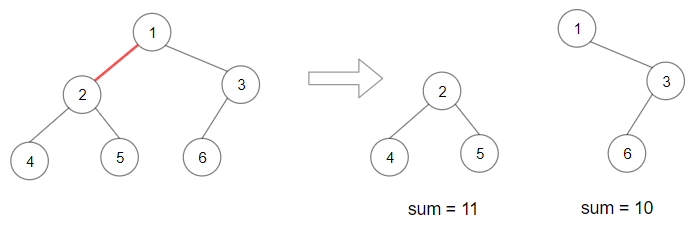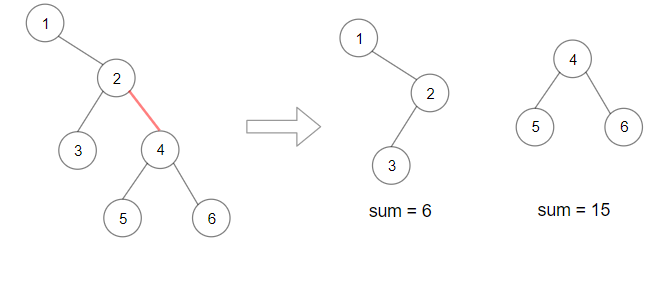Maximum Product of Splitted Binary Tree
Three simple concepts in this problem, here is the problem: https://leetcode.com/problems/maximum-product-of-splitted-binary-tree/


It can be solved in O(n)-time and O(1)-space, using the following concepts:
1343. Maximum Product of Splitted Binary Tree
Medium
Given a binary tree
root. Split the binary tree into two subtrees by removing 1 edge such that the product of the sums of the subtrees are maximized.
Since the answer may be too large, return it modulo 10^9 + 7.
Example 1:

Input: root = [1,2,3,4,5,6] Output: 110 Explanation: Remove the red edge and get 2 binary trees with sum 11 and 10. Their product is 110 (11*10)
Example 2:

Input: root = [1,null,2,3,4,null,null,5,6] Output: 90 Explanation: Remove the red edge and get 2 binary trees with sum 15 and 6.Their product is 90 (15*6)
Example 3:
Input: root = [2,3,9,10,7,8,6,5,4,11,1] Output: 1025
Example 4:
Input: root = [1,1] Output: 1
Constraints:
- Each tree has at most
50000nodes and at least2nodes. - Each node's value is between
[1, 10000].
- Utilization of Post-Order Traversal (SetValSumNodes)
- Reusing the node val to store the sum of all the elements for that sub-tree
- BigInteger computation (Numerics library) followed by the mod 10^9 + 7
Notice that due to #2, you can compute the current product in constant time (current product: (root.val - currentNode.left.val) * currentNode.left.val). Code is below, cheers, ACC.
public class Solution
{
public int MaxProduct(TreeNode root)
{
if (root == null) return 0;
BigInteger val = -1;
SetValSumNodes(root);
MaxProduct(root, root.val, ref val);
return (int)(val % 1000000007);
}
private void MaxProduct(TreeNode node,
int sumAllNodes,
ref BigInteger prod)
{
if (node == null || (node.left == null && node.right == null)) return;
if (node.left != null)
{
BigInteger current = (BigInteger)(sumAllNodes - node.left.val) * node.left.val;
prod = BigInteger.Max(prod, current);
}
if (node.right != null)
{
BigInteger current = (BigInteger)(sumAllNodes - node.right.val) * node.right.val;
prod = BigInteger.Max(prod, current);
}
MaxProduct(node.left, sumAllNodes, ref prod);
MaxProduct(node.right, sumAllNodes, ref prod);
}
private void SetValSumNodes(TreeNode node)
{
if (node == null) return;
SetValSumNodes(node.left);
SetValSumNodes(node.right);
if (node.left != null) node.val += node.left.val;
if (node.right != null) node.val += node.right.val;
}
}
Wow! this is Amazing! Do you know your hidden name meaning ? Click here to find your hidden name meaning
ReplyDelete